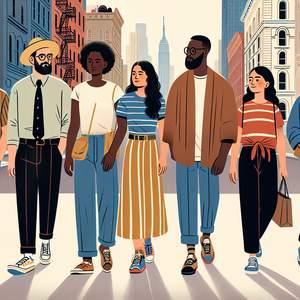The Future of Design: How AI Agents Could Revolutionize Creative Workflows

One of the most significant advantages of incorporating AI agents into creative workflows is their ability to streamline processes. Traditional design workflows can often be cumbersome, filled with repetitive tasks that consume valuable time and energy. AI agents can automate these mundane tasks, such as organizing files, generating reports, and even performing preliminary design iterations. For instance, design teams can utilize AI algorithms to analyze existing design assets and suggest layout options, enabling designers to focus more on the creative aspects rather than administrative duties. A notable example of this is Adobe's AI tool, Adobe Sensei, which enhances creative workflows by automating tasks like image tagging and photo editing. By enabling designers to spend less time on trivial tasks, these tools allow for more focus on creativity and innovation. Moreover, AI can assist in project management by predicting potential bottlenecks based on historical data and current project metrics. By analyzing past projects, AI can identify patterns and suggest efficient resource allocation, ensuring that deadlines are met without compromising quality. Tools like Trello and Asana are already integrating AI features that assist in task prioritization and team communication, making project management more efficient and less stressful.
Enhancing Collaboration
Collaboration is at the heart of creative work, often requiring seamless communication and coordination among team members. AI agents can serve as facilitators of collaboration by providing a centralized platform for sharing ideas, feedback, and resources. For example, AI-driven tools can curate and analyze input from multiple team members, synthesizing diverse perspectives into cohesive design concepts. This not only fosters a more inclusive creative environment but also enhances the quality of the final output. Additionally, AI can bridge the gap between different disciplines within a creative team. Designers, writers, and marketers often work in silos, which can lead to misalignment in vision and strategy. AI agents can help integrate these diverse skill sets by providing insights that align creative goals with business objectives. For instance, an AI system could analyze market trends and consumer behavior to inform designers about what resonates with audiences, allowing for more targeted and effective creative strategies. Companies like Figma are already moving towards this integration, offering collaborative design platforms that leverage AI to enhance teamwork and communication. The ability to access real-time feedback and insights from AI not only streamlines the design process but also encourages a culture of collaboration.
Inspiring Innovative Design Solutions
Perhaps the most exciting prospect of AI agents in the creative industry is their ability to inspire innovative design solutions. By leveraging vast amounts of data from various sources, AI can identify emerging trends and suggest novel ideas that may not be immediately apparent to human designers. This predictive capability can empower designers to think outside the box and explore uncharted territories in their work. For example, AI can analyze social media feeds, consumer reviews, and market research to identify shifts in consumer preferences and emerging aesthetic trends. Design teams that utilize AI-driven insights can stay ahead of the curve, ensuring that their work remains relevant and appealing. Platforms like Canva are beginning to incorporate these features, allowing users to access design templates based on current trends and user preferences. Furthermore, AI can even generate design prototypes based on specific parameters set by designers, providing a starting point that can be refined and customized. This capability not only accelerates the prototyping phase but also introduces a level of creativity that might not have been considered otherwise.
The integration of AI agents into creative workflows represents a paradigm shift that has the potential to revolutionize the way designers and creative professionals work. By streamlining workflows, enhancing collaboration, and inspiring innovative solutions, AI is not just a tool but a transformative partner in the creative process. As the creative industry continues to embrace this technology, it will be fascinating to see how AI agents evolve and shape the future of design, enabling teams to push the boundaries of creativity and deliver exceptional results. Embracing AI in creative workflows is not merely about keeping up with technological advancements; it’s about harnessing the power of innovation to unlock new levels of creativity and efficiency. Companies that recognize the value of AI agents—such as advertising firms, design studios, and branding agencies—stand to gain significantly from this collaboration. As we move forward, the challenge will be to find the right balance between human creativity and AI capabilities, ensuring that the future of design is as imaginative and impactful as possible.
AI Design Strategist
Design agencies, tech startups, large corporations
Core Responsibilities
Develop and implement AI-driven design strategies that enhance creative outputs and streamline workflows.
Collaborate with design teams to integrate AI tools into their processes, ensuring a seamless transition and effective use of technology.
Analyze data from AI systems to inform design decisions and identify opportunities for innovation.
Required Skills
Strong understanding of both design principles and AI technologies.
Experience with design software (e.g., Adobe Creative Suite) and AI tools (e.g., Adobe Sensei).
Excellent communication skills to facilitate collaboration between technical and creative teams.
Creative Technologist
Advertising agencies, digital media firms, tech companies
Core Responsibilities
Bridge the gap between creative teams and technology by developing innovative solutions that leverage AI.
Experiment with new AI tools and platforms to enhance creative processes and outputs.
Mentor design teams on the effective use of technology in their workflows.
Required Skills
Proficient in programming languages such as Python or JavaScript, alongside a strong creative background.
Familiarity with machine learning concepts and their application in design.
Ability to think critically and creatively to solve complex design challenges using technology.
UX Researcher with AI Focus
Tech companies, product design firms, UX research agencies
Core Responsibilities
Conduct user research to understand how AI can improve user experiences in design products.
Synthesize research findings into actionable insights that guide UX design decisions.
Collaborate with designers and product teams to test and iterate on AI-driven design solutions.
Required Skills
Strong skills in qualitative and quantitative research methodologies.
Experience with user testing tools and AI analytics platforms.
Excellent communication skills to articulate research insights to diverse stakeholders.
Data-Driven Graphic Designer
Marketing agencies, social media firms, e-commerce companies
Core Responsibilities
Utilize AI analytics to inform design choices and create visually appealing graphics that resonate with target audiences.
Iterate on designs based on data insights, ensuring alignment with current trends and user preferences.
Collaborate with marketing teams to produce visuals that support data-driven campaigns.
Required Skills
Proficiency in graphic design software (e.g., Adobe Illustrator, Photoshop) and familiarity with data visualization tools.
Strong analytical skills to interpret data and apply it creatively.
Understanding of branding principles and consumer psychology.
AI Content Curator
Digital publishing companies, online learning platforms, content-driven organizations
Core Responsibilities
Leverage AI tools to curate and recommend design content that aligns with user needs and current market trends.
Analyze user engagement data to refine content strategies and improve recommendations.
Collaborate with designers and content creators to ensure the curated content is relevant and impactful.
Required Skills
Strong understanding of content management systems and AI-driven recommendation engines.
Excellent organizational skills and attention to detail in content curation.
Ability to work collaboratively within creative teams to align content with design goals.


